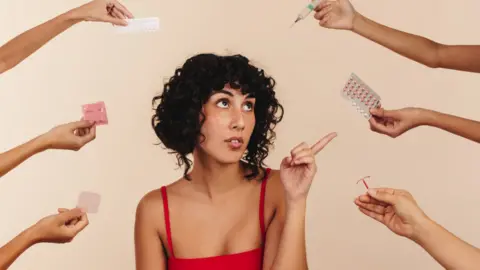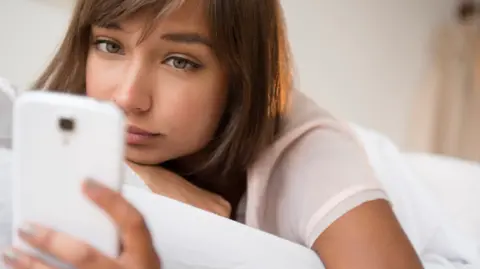'Pregnancy is a risk I'm willing to take': Why some women are ditching the pill
 Getty Images
Getty ImagesWhen the BBC reported a shift in contraception use from "hormonal" products like the pill to "natural" fertility tracking apps among some women seeking abortions, many other women got in touch sharing their experiences.
Their stories reveal how difficult it can be to find birth control that fits your lifestyle and has acceptable side effects.
There are pros and cons with all types, health experts advise.
A method that suited you when you were 18 might not when you are 28, 38 or 48, says Paula Baraitser, medical director of the NHS-partnered free sexual health service provider SH:24.
Fertility tracking apps are a relatively new option that some people are using.
They use measurements like body temperature to predict ovulation so the user knows when she would be most likely to get pregnant each month or menstrual cycle and can avoid sex or use a condom on those days.
Trial and error
Dr Baraitser says some of the patients she sees have switched to the apps after struggling on hormonal treatments like the pill.
"Taking hormones changes your body and people are very individual in their responses, positive and negative.
"For example, oestrogen often reduces acne and combined hormonal methods, like the combined pill, patch or ring, help control your bleeding.
"On the other hand people might experience mood changes or changes to their libido."
She says it can be a process of trial and error, switching between methods until you find something that suits you.
Condoms are the only type of contraception that can both prevent pregnancy and protect against most sexually transmitted infections.
 Getty Images
Getty ImagesThe BBC heard from women about their experiences, none of them are identified or pictured in this article to protect their anonymity.
Georgia, is 25 and from Bristol. She has been using a fertility tracking app for the last seven months.
She says her mental wellbeing improved massively when she came off the pill, which she had been taking for around a decade.
Georgia is aware that, unless used carefully, there is the risk of unwanted pregnancy but says "it's a risk I'm willing to take to let my body be how it should be".
"[On the pill] I struggled a lot with my moods, I felt completely out of control. After I decided to come off the pill I did notice a massive difference in my ability to regulate emotions, how I'm feeling about life and about myself.
"I looked at the copper IUD but the heavy bleeding put me off. I already get heavy periods so going onto something that could make them worse felt wrong.
"I was conscious that for a long time I had been altering my body's hormones. It bothered me a lot and I didn't want to continue to do that.
"I'm a personal trainer and work a lot with women. It's extremely frustrating the research is so dated.
"If you go to the GP, a doctor might say 'try this'. But for you to know if a contraceptive is working for your body, you sometimes have to wait months.
"It's come to the point now where [using a tracking app] is a risk I'm willing to take to let my body be how it should be."
'Stakes too high'
Emily, who is 39 and from Glasgow, had an abortion in 2021 after finding out she was pregnant while using a tracking app as contraception.
In 2018 she came off the pill which she'd been on since the age of 17, initially to control acne.
"My mood was low, I was putting weight on and I couldn't lose it. I was experiencing symptoms like low libido. I gave it a break and as soon as I came off it I felt infinitely better," Emily said.
Looking for a non-hormonal alternative and wanting to avoid the experience of having a coil fitted, she chose to use the menstrual cycle tracking feature on her iPhone Health app.
In 2021 she found out she was two months pregnant with her then partner of four months - who is now her husband.
Emily said: "I got a urine infection which kicked my cycle out of sync a little bit. Before I knew it a couple of months passed and I'd not had a period. I felt really unwell one day and thought either this is Covid, or I'm pregnant. I went home and took a test for both. The pregnancy test came back positive.
She says her partner, now husband, was amazing.
"We spoke about it and read lots of resources online. We barely knew each other at the time and didn't live together so we decided we couldn't go ahead and have a child."
Following the termination, she decided to try a different contraceptive.
"[With tracking apps] I know your cycle needs to be really regular and really consistent. I didn't want to gamble that risk again," she said.
She opted for the the non-hormonal copper coil.
"I've always had lower back pain but, since the coil, on my periods that is now worse. And I now get pain during ovulation. It's not ideal, but it is what it is.
"It enrages me that in this day and age there's so much medical research in other areas, but then we have a contraceptive pill over 50 years old and this barbaric coil insertion procedure."
'Better choices for women'
Freya, who is 26, came off hormonal contraception in an attempt to see if it might help her mental health.
"I had been on it since I was 15 or so, so I didn't really 'know myself' without it.
"I opted to use condoms during the times when the app said I would be at risk of pregnancy.
"I ended up pregnant within three months and opted for an abortion which I found extremely distressing mentally and physically.
"The fact I'd been using the app instead of my normal contraception made me feel as though I couldn't tell anyone."
She says the experience has put her off using natural contraception again because "the stakes feel too high."
Alice, is 41 and from Farnborough. She had side effects while on the pill, including low libido, weight gain, mood swings and bleeding.
"I now have a daughter and I feel sad about her future.
"Why do women and girls have to bear the responsibility of not getting pregnant.
"Immediately after giving birth you are asked what kind of contraception do you want.
"Luckily my husband is fine with condoms... and now I use a fertility app to just track my period but I don't rely on it."
For people interested in fertility tracker apps, there are some things to consider:
- There are lots of apps but only one licensed fertility app for contraceptive use in the UK
- Period trackers are not the same and have not been designed to predict when you ovulate or might be fertile
- If your menstrual cycles are not the same length every month the days of your cycle when you are fertile might change
- If you have a very irregular cycle then apps may find it more difficult to predict your fertility
- You must follow the app instructions correctly for it to be as reliable as possible
- If you are monitoring body temperature then how you do it is important
Dr Baraitser explained: "After ovulation your temperature goes up - but by a very small amount.
"To pick up a difference this small, you have to measure your temperature whenever the app tells you to, often daily, and you need to do this before you have got out of bed in the morning and before you have eaten or have had anything to drink. If you have a busy life, if you work nights, if you have young children this may be hard to do."
New technologies that monitor temperature continuously - such as wrist temperature measured by a smart watch - may help with this, she said.
The app can only tell you when to have sex and when not to. It's up to you to remember and act on the advice.
Anatole Menon-Johansson is clinical director at Brook which has sexual health clinics around the UK. He said weighing the chance of having an unintended pregnancy was important to consider.
He advised: "Find a provider that will listen to you and allow you to explore and experiment with contraceptive methods.
"It will sometimes take a few attempts to find the best one for you."
Companies say apps can be as much as 93% reliable when used correctly, meaning 7 in every 100 women would get pregnant when tracking their fertility for a year.
That is slightly better than the 91% seen with typical or less than perfect use of the pill and the mini pill.
Perfect use of the pill increases the success rate to 99% - similar to hormone-releasing coils or implants, which do not rely on the user remembering to take them.
